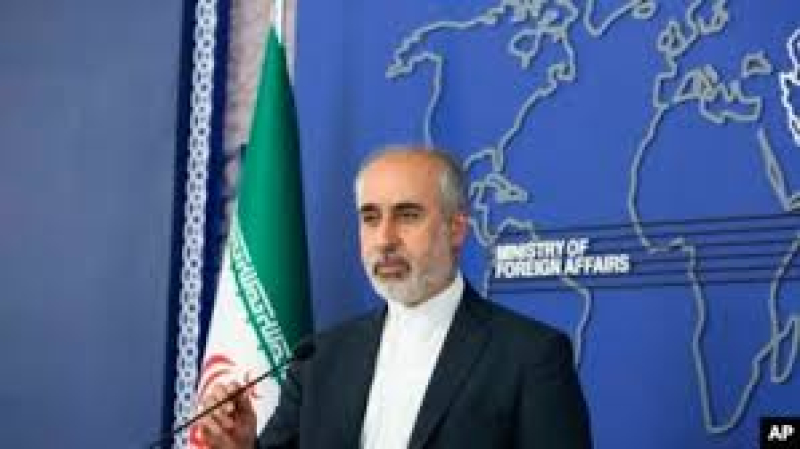- Puppet show enchants Children as Boi Mela comes alive on day 2 |
- DSCC Admin Salam’s drive to make South Dhaka a ‘clean city’ |
- 274 Taliban Dead, 55 Pakistan Troops Killed |
- Now 'open war' with Afghanistan after latest strikes |
- Dhaka's air quality fourth worst in world on Friday morning |
US and EU eye North Korea-Iran military cooperation

The United States and the European Union say they are keeping their eyes on Pyongyang and Tehran for any possible military cooperation between the two as Iran confirms a North Korean delegation's visit to the country.
The U.S. "will use all available tools, including interdiction and sanctions, to address such activities," a State Department spokesperson said in an email to VOA's Korean Service on Friday.
An EU spokesperson on the same day told VOA Korean that it is also "following closely Iran-DPRK relations and their potential cooperation that could indeed be concerning on certain issues if it violates existing U.N. sanctions."
North Korea's official name is the Democratic People's Republic of Korea.
Pyongyang announced through its state-run KCNA that it sent a delegation led by its External Economic Relations Minister Yun Jong Ho to Iran on April 23.
Iranian Foreign Ministry spokesperson Nasser Kanaani said on Monday that a North Korean delegation visited Tehran last week to discuss bilateral trade, according to Reuters.
But Kanaani dismissed any suspected cooperation on their missile programs, saying it is a "biased speculation" based on "untrue" reports.
The U.S. has accused Pyongyang, Tehran and Beijing of supporting Russia's war against Ukraine.
Tehran has also been involved in conflict with Israel.
Iran attacked Israel on April 13 with more than 300 missiles and drones and said the assault was in retaliation against an Israeli strike on an Iranian consular building in Damascus, Syria. Israel responded by launching a counterstrike into Iran on April 18.
"It certainly is possible and even probable" that Pyongyang and Tehran are cooperating militarily in the current Middle East conflict, just as they have done since the 1980s, said Robert Peters, a research fellow for nuclear deterrence and missile defense at the Heritage Foundation's Allison Center for National Security.
Iran is motivated to acquire missiles from North Korea "given Iran's current approach of laying a siege [around] Israel using missiles supplied to its proxies – Hezbollah, Hamas, and Houthis," Peters said.
Hezbollah, Hamas and the Houthis are Iran-backed militant groups that base their operations in Lebanon, the Gaza Strip and Yemen, respectively.
Pyongyang's arms sales to Tehran began in the 1980s during Iran's war with Iraq. Their cooperation on missile programs continued since then and expanded.
In January 2016, the U.S. Treasury sanctioned Iranians for traveling to Pyongyang and collaborating on the development of North Korea's 80-ton rocket booster. A few months later, North Korea said it had tested a new rocket engine that had a thrust of 80 tons and would be used in a new space launch vehicle.
North Korea has been accusing Israel of committing "terrorism" against Iran since the Oct. 7 attack on Israel by the Palestinian militant group Hamas.
In December, the Israel Defense Forces said North Korean weapons have been turning up in Gaza, reports VOA.
Bruce Bechtol, a former intelligence officer at the U.S. Defense Intelligence Agency and now a professor at Angelo University in Texas, said arms transfers between Pyongyang and Tehran are "inevitable" regardless of any meeting between the two last week.
"Some of the weapons that North Korea has sent to Russia have gone to Iran first and then up to the Caspian Sea, and Russia has used those weapons in the Ukraine," said Bechtol, the author of the book “North Korean Military Proliferation in the Middle East and Africa.”
He told VOA that Iran's Emad medium-range ballistic missiles used in the attack against Israel earlier in the month were made based on the Shahab-3, which Iran first put into use in 2003. That, in turn, was developed from North Korean NoDong missiles that were sent to Tehran in the 1990s.
Bechtol said Iran's Shahab-3 missiles were developed in a facility that North Korea built for Tehran in the early 2000s. He said Tehran is likely seeking to acquire Pyongyang's Hwasong-15 intercontinental ballistic missiles.

